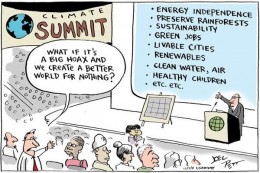The Evidence for Global Climate Disruption continues to mount
http://www.reuters.com/article/2011/01/ … TE20110127
A North Atlantic current flowing into the Arctic Ocean is warmer than for at least 2,000 years in a sign that global warming is likely to bring ice-free seas around the North Pole in summers, a study showed.
Scientists said that waters at the northern end of the Gulf Stream, between Greenland and the Norwegian archipelago of Svalbard, averaged 6 degrees Celsius (42.80F) in recent summers, warmer than at natural peaks during Roman or Medieval times.
"The temperature is unprecedented in the past 2,000 years," lead author Robert Spielhagen of the Academy of Sciences, Humanities and Literature in Mainz, Germany, told Reuters of the study in Friday's edition of the journal Science.
The summer water temperatures, reconstructed from the makeup of tiny organisms buried in sediments in the Fram strait, have risen from an average 5.2 degrees Celsius (41.36F) from 1890-2007 and about 3.4C (38.12F) in the previous 1,900 years.LOLOLOL! OMG!!! Almost nobody is buying the global warming nonsense anymore!
So explain the facts presented in this article then please.
Seeing that the actual accurate surface temperature record only dates back to about year 1850 AD this aught to be good.

Among FoxNews viewers, your statement is true. Among the logical remainder of the population, you are dead wrong.
Talk about an overstatement.
A Spokeswoman for Fox News?
The flow of warm water from the equator is nothing new, will you be telling us about all the warm air that comes from the equator as well?
The earth is getting warmer, we are emerging from a mini ice age, and we will be seeing warmer temperatures. Previous warming shave always been of benefit to humanity though, so we may be in for a treat.Did you see this part?
"unprecedented in the past 2,000 years"
and
"The summer water temperatures, reconstructed from the makeup of tiny organisms buried in sediments in the Fram strait, have risen from an average 5.2 degrees Celsius (41.36F) from 1890-2007 and about 3.4C (38.12F) in the previous 1,900 years [to] 6 degrees Celsius (42.80F) in recent summers, warmer than at natural peaks during Roman or Medieval times."
More info here:
http://www.sciencedaily.com/releases/20 … 141659.htm
http://news.discovery.com/earth/warm-no … rctic.html
I agree with William, the usual weather patterns various locations in the world are experiencing right now are the result of global warming. The flooding in Brazil and Australia, the persistent snowstorms in the northeast of the U.S. and the rain in California recently are all the result of this warming trend in the global temperature. The facts are there and always have been, the controversy is scientists cannot pinpoint whether the warming trend is a result of human activity or is this just a natural phenomena where the global climate is simply going through a period of readjustment.
Hi Melpor,
I don't think there's any real controversy. Some skepticism, definitely - and that skepticism seems to fit quite well with the profit motive of oil and gas companies.
But consider these facts: CO2 is a greenhouse gas and humans have increased its concentration in the atmosphere. We see increased warming. The warming fits the profile we would expect from CO2 induced global warming - see these two links for more on that:
http://www.skepticalscience.com/empiric … arming.htm
http://hubpages.com/hub/CO2-Causes-Glob … ow-We-Know
And the final fact that must be taken into consideration: the skeptics have not produced a single alternative theory to explain the current warming. Not one.
So we have a clear mechanism for warming - CO2 - and warming that fits the pattern we would predict from greenhouse gases. We have no other explanation besides CO2.
Why do people still think there is a controversy?
"The Evidence for Global Climate Disruption continues to mount"




So you have disproved global warming Jim?
Well I read a paper about a month ago which said that our current position in the sun system and various phenomena caused by gravitational effects and the sun seem to cause most of the global warming on earth but even if that's true (there's still a huge debate going on about the role of mankind in this global warming process, and "Science Magazine" tends to be a bit more on the side of the ones thinking that mankind caused a large amount of global warming) I still think that we should be a bit more careful regarding pollution, because our lungs "feel" the difference (the smog in Mexico City or Shanghai in the summer- I tell you, it's impossible to breathe!).
But well Earth is only a temporary shelter for mankind and if you believe some famous Astrophysicists we better start colonizing other planets
William, even with that bit you quoted the date 1890 was mentioned. The years 1890-2007 to be exact.
Now how many fridges with CFC gases did they have exactly in 1890?
They didn't even have electricity, did they? So how on earth can what they started then be responsible for global warming now?
What is far more likely is partly as Thisioli said, we are emerging from the mini-ice age and no one doubts there was a mini ice age of the 15th-16th century, and sunspot activity on the sun. (well they would be on the sun, I suppose, being sunspots).
I just never believed them anyway. Not that I'm a science expert or anything, but we already knew that this planet has had several ice ages, and several periods of balmy weather in all history since we began.
Why should the activity of the 20th century suddenly change the pattern?
It doesn't make sense, but no doubt makes great political sense from someone trying to screw us over.What was mentioned is the average from 1890 to 2007, which is not just 1890.
The average for 1890 to 2007 was higher than the average for the previous 1900 years, and the average for the past three years was higher than the average for 1890 - 2007.How do you normally calculate an average of something?
I'm sure you know and are asking for rhetorical purposes, but:
http://en.wikipedia.org/wiki/AverageNot rhetorical at all. Some people really don't understand how to calculate the average of something. Since you do, I'm surprised you still believe what you've read.
Gosh, I must be dense. Please explain what you mean?
I really don't know how to explain it any better if you understand how to calculate the average of something. That is the explanation.
Well, I understand how to calculate averages several different ways and the article makes complete sense to me. Not sure what you're getting at.
Basically, it's warmer now that at any time in the past 2000 years, according to their research.
IzzyM, also bear in mind that consumption of fossil fuels in the form (mainly) of coal had been increasing steadily for about 100 years by 1890 and that major land use changes were well under way as well. Humans have been doing things like logging and plowing for thousands of years, but it was only really in the 19th century that we got truly efficient at it, so you can see here, for example, that the US lost far more virgin forest in the 70 years between 1850 and 1920 than in the previous 230 combined:

By 1890, we had also started the process of converting 99% of the native tallgrass prairie to farmland, a process that, like logging, releases thousands of tons of stored CO2 per acre, and similar patterns were going on in many other parts of the world as well. You don't need automobiles and refrigerators to begin to affect climate - saws and plows will do just fine.
Also, CFCs are involved with ozone depletion, not climate change.Those are interesting charts about deforestation. Thanks for posting them, and yes I am inclined to agree that deforestation throughout the world is could well be responsible for climate change. (more than burning fossil fuels etc).
I had no idea that the US was once so heavily forested.
I do know that huge parts of equatorial Africa and South America have been deforested (the rainforests) and this has resulted in the spread of the deserts - which when you think about it pretty amazing - they were RAINFORESTS, meaning they were wet, and take the trees away and the whole area became arid and lost their humidity, all within a few years.
We should all plant more trees.Yeah, the influence of forests on the climate is really incredible. Much of the Middle East used to be forested, for example, but it got logged, overgrazed, and salted into oblivion, so now many parts are little more than barren wasteland. Desert wasteland, because trees make rain.
Geoff Lawton is one of the people who's been out proving that we can repair this sort of damage and re-green many of the world's man-made deserts and scrublands:
http://www.youtube.com/watch?v=sohI6vnWZmk
It would take a concerted effort, but in the process, we'd fight climate change, improve food security, help preserve biodiversity, build better soil, and create more sustainable livelihoods for people. I say, what are we waiting for?
oh and 20,000 years is merely a blink in the eye of Earth's history.
Edit - you said 2,000 years. Not even a flicker, never mind a blink.Environmentalists aren't concerned about AGW because we're concerned about the Earth. The Earth will survive anything we can throw at her. It's humanity we're worried about.
In human terms, 2,000 years is a very long time indeed. We as a species have been brought to the brink of extinction by natural climate change before, and chances are we will again some day. But killing ourselves through short-sighted greed and willful ignorance is pretty bloody stupid.Humans have been on the planet for about 200,000 years according to the experts, and I honestly don't think the burning of fossil fuels or the release of CFC gases which is apparently causing global warming is going to the end of us. We will adapt as we have many times in the past.
I still think we should plant more forests though.I don't think climate change by itself is likely to kill us off, but we're facing a perfect storm of environmental issues - climate change, soil depletion, groundwater depletion, loss of biodiversity, etc. etc. etc. - and I think the combination of all of them has the potential to put a major dent in the human population, certainly within the next 500 years, possibly within the next 100. By major, I mean 75% or more. That's not something I want my children, grandchildren, or even great-great-great grandchildren to live through if it's possible to avoid it, and personally, I think it still is, if people would just stop denying that there's a problem.

It's not global warming that will kill us, either. It's the effect of global warming on the natural systems that support us.
For 200,000 years, there have been a few million humans on the planet. Now there are nine billion.
We are already seeing the stresses that this huge population is putting on natural systems - take the ocean for example. As the easy to get to fish get depleted, we've started deep dredging the ocean for fish. Many fisheries around the world are depleted or approaching depletion - and these fisheries feed billions of people.
Now, if it was just a matter of changing how we fish, it would be relatively simple to let the fisheries regenerate and start harvesting them at a more sustainable rate. But climate change will cause fish populations to shift. Warm water fish will move further north - disrupting the cold water ecosystems even more than the changing temperature and overfishing. Organisms that depend on the colder water will die off, which means less food for the bigger fish that feed off of them.
Then there's ocean acidification, which kills corals and many other organisms. Again, this will mean a loss of habitat, food, and more fish kills.
If you sit and think about this for a few minutes, you'll see the ultimate result on the oceans, and on humans who depend on the oceans for food.
Here's a pretty random assortment of links that illustrate my point:
http://www.csmonitor.com/Science/2010/0 … ecosystems
http://www.ciel.org/Climate/Climate_Arctic.html
http://www.ouramazingplanet.com/ocean-e … ange-0282/
http://www.climateshifts.org/?p=6221
http://www.enn.com/press_releases/2296
http://www.newera.com.na/article.php?ar … e%20change
William, I do not know why people see this as a controversial topic or have so much skepticism about it when all the evidence are there especially in the recent weather pattern changes that we are having now.
Related Discussions
- 21
Ice Caps Melting 5x faster than in the 90's- Global Warming Evidence
by Tammy Barnette 12 years ago
WASHINGTON — The melting of polar ice caps raised sea levels by nearly half an inch (11 millimeters) over the last two decades, scientists said Thursday, calling it the most definitive measure yet of the impact of climate changehttp://www.google.com/hostednews/afp/ar … 0048b7.4c1Can we now...
- 21
Global Warming in Australia to Be Severe
by Dan Harmon 7 years ago
Recent studies indicate that even if the Paris Accords are successful, Sydney may find itself with temperatures of 50 degrees (122F). "Major Australian cities, such as Sydney and Melbourne, may experience unprecedented temperatures of 50 degrees Celsius under 2 degrees of global...
- 38
Why do you not believe in Global Warming/Climate Change?
by Randy Godwin 7 years ago
Why do you not believe in Global Warming/Climate Change?I have no doubt our earth is warming at an alarming rate. One of the reasons I think this is because of the photo I included with the question. Otzi--the Iceman--was frozen over 5000 years ago and has remained that way through all sorts of...
- 141
Is Global Warming A "Trick" ?
by ediggity 14 years ago
http://www.nytimes.com/2009/11/21/scien … imate.htmlPeople wouldn't alter scientific data for their own personal benefit would they? There's not any money to be made with Global Warming is their?To be fair, the rebuttal:http://www.realclimate.org/index.php/ar …...
- 34
Global warming - A global warning?
by Pamda Man 15 years ago
I recently did some research on global warming. I found out that the USA is emitting over 25% of the world's polluting gases. These include sulphur dioxide which causes acid rain, and nitrous oxides which causes health problems. I find this very alarming, as the USA, as a developed country, is...
- 82
Arctic Ice Melting Faster Than Predicted: Global Warming is Real
by William R. Wilson 14 years ago
http://www.huffingtonpost.com/2011/05/0 … amp;src=spSTOCKHOLM -- A new assessment of climate change in the Arctic shows the region's ice and snow are melting faster than previously thought and sharply raises projections of global sea level rise this century.

















